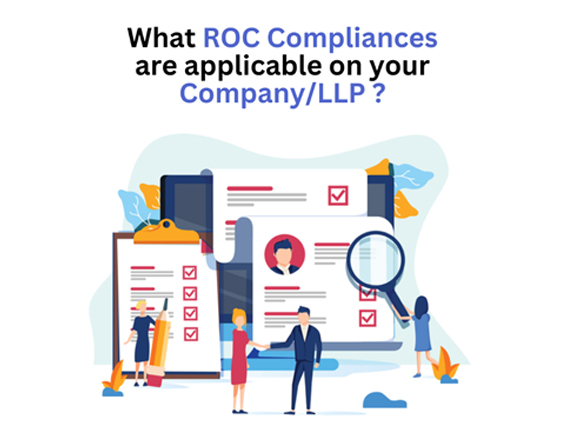
What ROC Compliances are applicable on your company/LLP?
Incorporating a Company/LLP (Limited Liability Partnership) is not enough, one must also ensure the smooth running of its entity. And for that purpose, one must know what exactly ROC compliances are and why are these important.
Although, Incorporation is a one-time process but there are many other things which require special consideration as non-compliance of law always comes at a cost.
The annual ROC compliances are detailed reporting of the business procedures that every registered company (public/private)/LLP in India should submit within the due date prescribed in the Companies Act, 2013 and the Companies Rules thereunder.
In simpler terms, a company is required to file various forms with the ROC, via which it reports on its activities and financial statements. The filings with ROC are mostly done annually or on the occurrence of the specified events.
| LLP | |||
| S. No. | MCA Form | Particulars | Due Date |
| 1 | Form 8 (Statement of Account & Solvency) | A declaration is made by the Partners that the LLP will be able to discharge its debts. Details of assets, liabilities, contribution made by the partners, turnover etc are reported to the ROC via this form. | Within 30 days from the end of 6 months of every financial year i.e., by 30th October of the next FY. |
| 2 | Form 11 (Statement of Annual Return) | In this form summary of management affairs, details of the partners and the contribution made by the partners is given. | Within 60 days from the end of the FY i.e., by 30th May of the next financial year. |
| 3 | DIR-3 KYC | Like Company directors, LLP designated partners are also required to complete their KYC. Every Partner who holds a DPIN must submit this Form or complete online DIR KYC. | On or before 30th September of every FY. |
| Non-Compliance | Form 8 & Form 11- Penalty of Rs. 100 per day is liable till the date of filing.DIR-3 KYC- Deactivation of DPIN (can be re-activated after payment of late fees of Rs. 5,000 only) |
| COMPANY | |||
| 1 | Form DPT 3 (Return of Deposits) | Every company needs to file this return furnishing information about deposits and/ or outstanding receipts of loan or money other than deposits | On or before 30th June |
| 2 | DIR-3 KYC | KYC submission for all the DIN holders. | On or before 30th September |
| 3 | Form AOC 4 (Filing of Annual Accounts) | Detailed information about the company’s auditor report, balance sheet, P&L account, related party transactions, CSR etc. | Within 30 days from the conclusion of the AGM. |
| 4 | From MGT 7 (Filing of Annual Returns) | Detailed information about the KMPs, directors, promoters, company debenture holders, shareholding patterns, board and general meetings, remuneration of directors & KMPs etc. | Within 60 days from the conclusion of the AGM. |
| 5 | Form MGT 14 | Details of resolutions passed by the Board regarding the board resolution for approval of board report and financial statements. | Within 30 days from the passing of resolution. |
| 6 | Form PAS 6 | Every unlisted public company is required to file a half-yearly reconciliation for share capital audit report to the ROC. | Within 60 days from the end of each half year. |
| 7 | Form MSME-1 | Details of outstanding payments to Micro, Small and Medium Enterprises. | Within 30 days from the end of half year. |
| Non-Compliance | Severe penalties may be levied in case of any default or delay in above filings.For every officer in default may be punished with imprisonment or fine or both. |
There are a few forms which must be filed only when a particular event happens and are not required to be filed on a regular basis. We at masterbrains.co.in are always available for your assistance and help you in ROC forms filings, Company law advisory services and other consultancy services.
– Contribution by – Mani Bhatia







